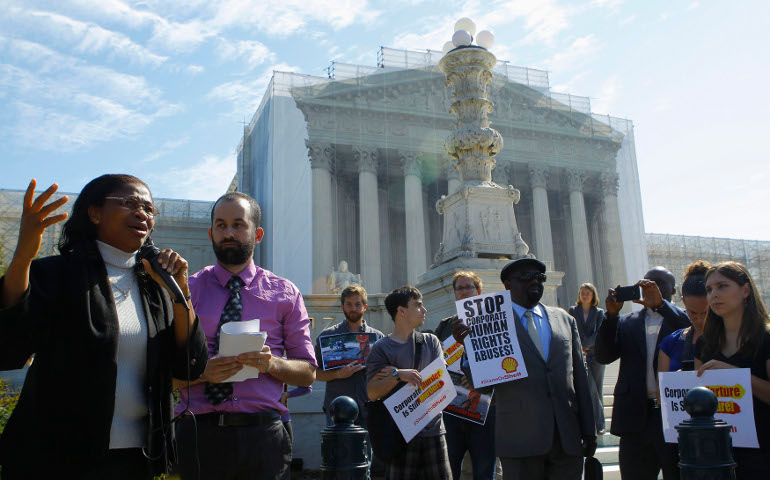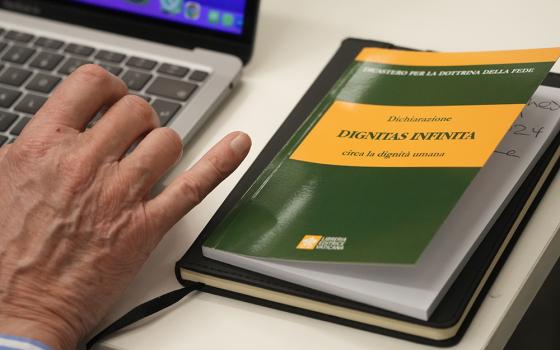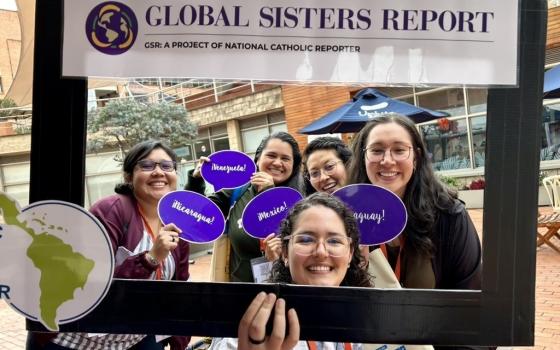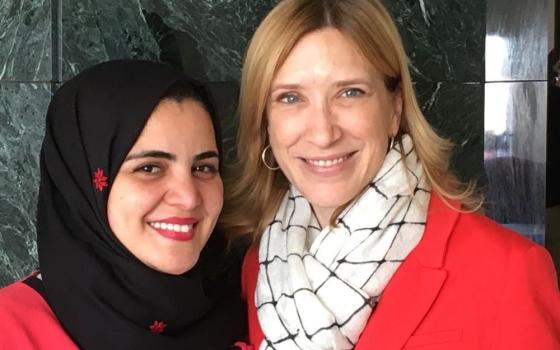
Plaintiff Esther Kiobel, left, joins a protest against Royal Dutch Shell Petroleum in front of the U.S. Supreme Court in Washington Oct. 1. (Newscom/Reuters/Gary Cameron)
On Oct. 1, the U.S. Supreme Court heard a case regarding an American law that allows foreign plaintiffs to have claims for human rights abuses heard in U.S. courts. This law has been shown to be important for the protection of members of religious groups, including Catholics, throughout the world. It is my hope that the court, especially its six Catholic members, will uphold this law.
The law that is in dispute, the Alien Tort Statute, has been used to protect survivors of human rights abuses, including many religious groups. The statute was created in 1789 and allows foreign plaintiffs to sue in U.S. courts for the worst-of-the-worst international crimes such as slavery, torture and genocide. It has been used against both individual defendants and corporations that have committed atrocities overseas. The statute has allowed survivors and victims to pursue justice in the United States — for example, the family of assassinated Archbishop Oscar Romero of El Salvador, Muslims who were persecuted in Bosnia, and Christians who were subjected to torture and genocide in Sudan.
The Supreme Court has heard arguments about the Alien Tort Statute in Kiobel v. Royal Dutch Petroleum (Shell). In this case, a group of Nigerian plaintiffs in the United States sued Shell oil for allegedly hiring the notorious Nigerian military to rape, torture and murder activists who opposed oil drilling in the Niger Delta. Shell claimed that it could not be held liable under the Alien Tort Statute because it is a corporation and the alleged conduct took place overseas against foreigners.
If corporations are "persons" for purposes of political contributions, why not for human rights abuses?
All persons and communities of faith should be concerned about this case for several reasons. First, the statute has been used to protect victims of religious persecution. Second, faith-based organizations work in some of the most dangerous parts of the world and are particularly vulnerable to human rights crimes. Third, as Christians, we have a preferential commitment to protecting the most vulnerable among us. A law that holds extreme human rights abusers accountable for their actions merits our support.
As a priest and a person of faith, I support the Alien Tort Statute. For me, a telling example occurred when the statute finally saw justice done in the case of Romero, in what is truly an astonishing story.
Romero's episcopal ministry was dedicated to being "the voice of the voiceless" for the Salvadoran poor, which often meant that he was at odds with the repressive, military-dominated, extreme rightist government that was then in power. As a result, he became a target of the high command. In his last national weekly radio sermon he courageously addressed the Salvadoran military, "In the name of God, in the name of this suffering people whose cries rise to heaven more loudly each day, I implore you, I beg you, I order you in the name of God: Stop the repression."
The very next day, while he celebrated Mass, he was assassinated by a paramilitary death-squad member.
One of the architects of the assassination, Captain Alvaro Saravia, found safe haven in Modesto, Calif., where he ran a used-car dealership. Using the Alien Tort Statute, the Center for Justice and Accountability, a San Francisco human rights organization, brought suit on behalf of one of the archbishop's relatives in a U.S. court, which ordered Saravia to pay a $10 million judgment in 2004.
It was virtually impossible to obtain justice in El Salvador, an unfortunate and common situation under repressive regimes. After it was uncovered that forces aligned with the military conceived and coordinated the assassination, one of the private attorneys of the assassination's ringleader was appointed as prosecutor in the archbishop's case. The prosecutor bribed a common criminal with $50,000 to take the blame for the assassination; he later presented this "evidence" in court.
That same prosecutor subsequently became the chief justice of El Salvador's Supreme Court, then rescinded a warrant and withdrew an extradition request that had been issued for Saravia, who by now was enjoying a comfortable lifestyle in California.
If it were not for the Alien Tort Statute, the Romero case would never have come to court. Saravia would have been allowed to continue selling used cars, despite his role in perhaps the most shocking murder in Salvadoran history. The Salvadoran court system is not an exception; all too often, survivors and victims around the world face similar challenges in their domestic courts.
Similar to the archbishop's case, Sudanese Christians filed a case under the statute in a U.S. federal court after being subjected to torture and genocide by the Sudanese government. The class-action lawsuit alleged that a private corporation, Talisman Energy, had helped Sudanese government officials bomb and burn churches, kill church leaders, and attack villages by using foot soldiers, attackers on horseback, gunships and bombers. The church leaders argued that they were targeted because they occupied areas surrounding the company's oil exploration efforts. Although the plaintiffs did not win that case, it was an integral part of a successful campaign that persuaded Talisman to cease its cooperation with the Sudanese regime.
If the Supreme Court weakens or even eliminates the Alien Tort Statute, religious leaders and faith groups will lose a key opportunity for justice when they face persecution. Unfortunately, many of the places where human rights are violated are also the places where it is nearly impossible to bring those responsible to court. Often the Alien Tort Statute and U.S. courts are the only routes to justice.
I appeal to the justices to do what is right and uphold the statute for the sake of those men, women and children who suffer egregious human rights violations without any legal recourse.
[Jesuit Fr. Stephen A. Privett, president of the University of San Francisco, worked with the Jesuit Refugee Service in El Salvador in 1988.]







